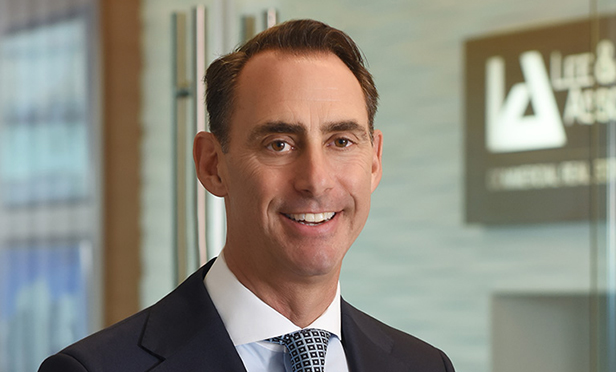 "We remain independent at a time of incredible and sometimes confusing consolidation," says Lee & Associates CEO Jeff Rinkov.
"We remain independent at a time of incredible and sometimes confusing consolidation," says Lee & Associates CEO Jeff Rinkov.
LOS ANGELES–Expansive. That's how Jeff Rinkov, CEO of Lee & Associates, sees the next year shaping up, both on a macro level for commercial real estate generally and more specifically for the firm he helms.
For Lee, currently marking its 40th anniversary, that expansion trend builds on a theme. Rinkov reports that, fresh on the heels of opening new branches throughout the year–mostly in Eastern markets such as Washington, DC; Raleigh; Miami; and Cincinnati–the firm plans to replicate that growth in multiple as-yet unnamed markets on both coasts in 2020.
He notes that the company continues to grow "free of debt" and the need to merge. "We remain independent at a time of incredible and sometimes confusing consolidation," he says. Expansion plans could roll out as early as the end of Q4.
Turning to the market as a whole, Rinkov is equally bullish. The office market in particular holds some interesting new-wave prospects. "We'll continue to see a lot more discussion about coworking," he says, and more institutional owners getting on the shared-space bandwagon. "By avoiding the middle man in the coworking discussion, more landlords will provide a similar experience. It makes much more sense that they capture that premium themselves."
Rather than dismissing the trend as a disintermediator, Rinkov says coworking challenges brokers to embrace it and thus provide their own expertise to a previously untapped and potential client base.
In terms of industrial, while warehousing and distribution may not "be the sexiest" markets to choose from, last-mile and same-day delivery will continue to redefine that market segment. "There's more capital chasing deals than there are places to put the capital," he says. "We've seen tremendous cap rate compression and substantial increases in rental rates. Construction is restrained, and there will continue to be tremendous demand from almost every category of investor."
He categorizes retail as a bifurcated market. "On the tenant side, we'll likely see continued weakness," he says. "We've lost some tremendous names in that category, and there are more to come. The other side of that coin is how creative landlords have been in their adoption and utilization." He cites such strategies as embracing medical office and some of that last-mile distribution space to backfill shuttered and otherwise empty retail spaces.
In all, slowdowns and rumors of slowdowns don't dampen Rinkov's bullish market view. He points to what he calls "a bit of slowing pace," attributable to situations beyond CRE control–such as trade wars and "weakness in certain markets around the globe" as well as the typical locale-specific hiccups. Rinkov also shared his concern regarding the impact of aggressive legislation nationwide, moving to restrict multifamily rent growth as a potential element of a "slowdown".
But the driving factors, he says, are those that, despite a slower pace, continue to buoy the market: "There's abundant capital looking to invest in hard, appreciable assets. The cost of that capital is at historic lows again, which is obviously good news for developers, acquirers and companies in an expansion mode."
The geo-political environment demands watching, of course. But for the foreseeable future, Rinkov is placing his bets on the fundamentals of the commercial real estate market, and the "many positive factors that are core to a continued expansive cycle.
© 2025 ALM Global, LLC, All Rights Reserved. Request academic re-use from www.copyright.com. All other uses, submit a request to [email protected]. For more information visit Asset & Logo Licensing.








